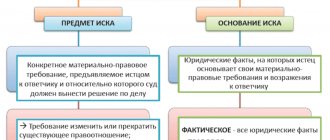Article updated: March 25, 2021
Alexey BessonovPracticing Moscow lawyer
Hello. I am a visiting lawyer from the Bessonov and Partners law firm. I specialize in discharging citizens in court.
According to paragraph 1 of Art. 35 Housing Code of the Russian Federation and paragraphs. 5 (e) clause 31 of Government Decree No. 713 of July 17, 1995, you can ONLY discharge a person from an apartment without his consent THROUGH THE COURT.
Therefore, when a person refuses to check out of a municipal apartment, ignores this requirement, or there is no communication with him, it is necessary to draw up a statement of claim for termination of the rights to use the residential premises and submit it along with other documents to the court.
IMPORTANT : In this article I wrote about the discharge of only an adult citizen (18 and older). When discharging a child, there are different conditions and nuances, so I wrote separate instructions on how to discharge a minor from a municipal apartment without his consent.
Using the instructions below, you can register not only the person registered in the apartment, but also the main tenant/tenant. Because family members of the main tenant/tenant have equal rights with him - clause 2 of Art. 69 Housing Code of the Russian Federation. This means they can write him out.
Is it possible to buy an apartment with registered people?
The law does not prohibit the sale of housing with people registered in it. The fact is that in case of purchase, the rights to use and dispose of the apartment are transferred to its new owner. Therefore, residents who are registered as citizens in this premises are required to move out of it as soon as possible.
In this regard, we can conclude that it is possible to buy an apartment with registered residents, but we must remember that there are categories of citizens who are almost impossible to discharge from the apartment. These include minors and incompetents. You can read more about the nuances of discharging children in this article.
Acquiring the right to use another residential premises
The fourth condition is the acquisition by the defendant of the right to use another residential premises in a new place of residence.
The court will also be responsible for clarifying the question of whether the defendant has acquired the right to use another residential premises.
In this case, it does not matter on what right the defendant acquired the right to use another residential premises: on the right of ownership, under a lease agreement, a sublease agreement or on another right.
If the defendant has acquired the right to use other premises, then this circumstance will be taken into account in favor of making a decision to recognize him as having lost the right to use the disputed apartment.
However, if the defendant, who voluntarily left the disputed apartment for another place of residence, does not have the right to use another residential premises, in other words, he does not have his own other housing (for example, he rents an apartment), then this circumstance in itself cannot be a basis for refusal in recognizing the defendant as having lost the right to use the disputed residential premises.
In other words, if the defendant who is registered in your apartment does not own another apartment, house or share in common property, this does not mean that he cannot be discharged.
Thus, if the defendant has moved out of your apartment, but he has no other housing, this does not mean that he will win the case.
The defendant’s lack of other housing does not guarantee him the right to be registered in your apartment.
What problems may arise
Buying a home with people registered in it is a tempting proposition. It is usually sold much cheaper than a similar one without tenants. Such a purchase may cause problems in the future. A person who is registered must deregister after the transaction is completed, but it often happens that citizens refuse to deregister voluntarily.
Even if the person registered does not live in this apartment, the owner will still have to pay utility bills for him. Difficulties may also arise if he decides to sell or exchange the apartment again.
In addition, there are persons who cannot be discharged. These include:
- people who can use housing by testamentary refusal;
- who refused to privatize the apartment in favor of other residents.
Such categories of citizens have the right to live in specific housing for life. Also, before purchasing an apartment, you should find out whether a convicted person serving a sentence in prison is registered in the housing. Because even if you deregister him, he can easily restore his registration if the deregistration procedure was carried out at the time he served his sentence.
If residents refuse or delay voluntary discharge, the issue will have to be resolved in court. To avoid this, before making a transaction, you need to check whether there are registered citizens in the apartment.
When drawing up a purchase and sale agreement, the owner is obliged to indicate in it the existing encumbrances (including registered persons). If he hides this fact, the buyer will subsequently be able to terminate the transaction in court.
Conditions for discharge are the same for everyone
It doesn’t matter who you want to write out: your ex-spouse, a close or distant relative, a stranger, etc. Kinship doesn't matter. Only for the convenience of readers, I wrote separate articles about the discharge from the municipal apartment of my ex-husband, ex-wife and my adult (adult) children (adult son/daughter/grandson).
Only a person can be discharged from a municipal apartment who, through his actions, shows that he himself has renounced his right of residence/use. Therefore, in a lawsuit and in court, you need to ask to recognize this person as having lost this right. In 2009, the Supreme Court ruled under what circumstances this can be done. They are listed in paragraph 32 of the Resolution No. 14 of July 2, 2009. ALL THE FOLLOWING CONDITIONS MUST BE FULFILLED and are considered by the judge in their entirety:
- A person must not live in an apartment for a long time - clause 3 of Art. 83 Housing Code of the Russian Federation. The longer he doesn't live, the better. The minimum period is not established by law and you will not find it in any official documents. Personally, I think the minimum is 3 years .
More precisely: if he does not live for a year, then the chance of being discharged is a maximum of 20%. If two years - 50%. Three years or more - 95%. All these % are my opinion based on 10 years of experience. Why not 100%? Firstly, there are other conditions, which are listed below. Secondly, you can’t predict everything accurately.↓ - He left the apartment on a permanent basis, and not temporarily due to study, work, business trips, treatment, etc. - Art.
71 Housing Code of the Russian Federation. That is, I took all my things out of the apartment. It’s even better if he lives in another locality. The longer a person does not live in an apartment, the more it is implied that he has moved out on a permanent basis. That’s why the minimum period of non-residence, which I indicated above, is important.↓ - Left voluntarily, and not forced - clause 2 of Art. 1 Residential Complex of the Russian Federation. For example, because of conflicts or he is in prison. The court will definitely not release a person who is in prison. After all, he left forcedly. Of course, you can submit a court verdict to the passport office and it will be issued, but only “formally”. After leaving prison, he can register back without any problems. And if the apartment becomes privatized, then through the court it is easy to challenge the privatization and get a share of the apartment. Even when the owner changes.↓
- From the moment of departure, he does not pay utility bills, does not participate in the repair and maintenance of the apartment - clause 4 of Art. 69 Housing Code of the Russian Federation. The minimum period for non-payment of utilities is also 3 years, as is the period for non-residence. If a person pays for at least some part of the utilities and proves this in court, he will not be discharged.↓
- He did not try to move into the apartment again, and if he did, he was NOT prevented from doing so.
The extract instructions themselves are written below.
You have a better chance of success with a lawyer and here's why
Even if all of the above conditions are met, this is only half the battle. The difficulty is that everything needs to be PROVED IN WRITING. The judge does not believe the words and arguments. And in order to prove everything, you need to provide the judge with certain certificates/acts from various government departments and organizations.
An ordinary citizen will not be able to obtain some documents because he does not have a certain status and authority. He will be able to submit requests, but they will not answer them, because they are not obliged to. Therefore, you need to contact a lawyer. He, having legal status, will make inquiries about the necessary organizations - paragraphs. 1 clause 3 art. 6 and paragraph 5 of Art. 6.1 Federal Law of May 31, 2002 No. 63-FZ. Organizations are required to respond to requests from lawyers, otherwise they face a fine - Art. 5.39 Code of Administrative Offenses of the Russian Federation.
If you do not contact an attorney, you can ask the judge to make requests. He won't offer it himself. The judge will formalize the requests and invite you to take them to the organizations. Plus, pick up the answers when they are ready, wasting your time and money. He will offer it, but he has no right to force it. THE WORST thing is that 1) you will not have the opportunity to adjust requests that are more beneficial to you. 2) You will also not be able to filter the responses received by discarding unnecessary ones. In addition, you won’t even recognize some of the answers - they will be sealed in envelopes. All this greatly reduces your chances of winning your case.
It's different with a lawyer. He will study your situation in detail, then before the trial he will send requests to those organizations and departments that are beneficial to you. The hired lawyer himself will draw up a request, send it and collect answers to them. And from the received answers he will select the most useful ones.
Our law office "Bessonov and Partners" offers residents of Moscow or the region. We will take on all the possible work - we will draw up a correct statement of claim, collect all the necessary documents and submit them to the court. You will not need to come to court hearings; the office's lawyer will participate in them and will do everything possible to win the case. At the end of the trial, we will bring you a copy of the court decision.
We have been working in the field of court records since 2008 and have won 84% of court cases.
The cost of the service is 90 thousand rubles. For visitors to this site there is a discount from 5% to 10%. To receive it, say that you came from the website “Prozhim.com”. For all questions, please call 8 (916) 594-57-31 (daily from 9:00 to 21:00 Moscow time / only for residents of Moscow and the region).
About your residential address
I will answer popular questions in advance - “If a person has moved out of a municipal apartment, but it is unknown where he lives now, what address of his residence should he indicate in the statement of claim? And if known, then indicate the actual address? Where will the subpoenas be sent to him?
The Supreme Court believes that the defendant’s residential address is his registration address - paragraph 63 of the Resolution of June 23, 2015 N25. Therefore, in the statement of claim and other documents, we indicate the person’s place of residence and the address of the municipal apartment from which he needs to be discharged. He is registered in it. The plaintiff has no obligation to know the actual residential address of the defendant.
As a result, all court summonses will be sent to the person at the address of the municipal apartment - Art. 113 Code of Civil Procedure of the Russian Federation. If he does not receive them (since he does not live there), the court will still consider him notified. The law will be respected. A citizen is obliged to receive correspondence that is important to him. If he does not appear in court, the claim will be considered without his participation - clause 4 of Art. 167 Code of Civil Procedure of the Russian Federation. This plays into the hands of the plaintiff, because the defendant will not be able to defend his interests in court.
How to check an apartment before buying
In order to eliminate the risk of purchasing housing with registered residents, it is necessary to check the presence of encumbrances in advance. To do this, you should ask the owner for an extract from the house register. You can get it at the passport office, but it is worth considering that it will only be issued to the owner. It will contain all information about all persons registered in the apartment.
It is important to know that only registered citizens appear on a regular apartment card. To find out information about people who are temporarily deregistered, you need to ask the owner to provide a detailed statement. This is the only way to find out whether there are persons in the house register who have been temporarily discharged but will be able to restore their registration. These include, for example, convicts serving sentences.
Prisoners who own an apartment and who signed an agreement to sell it while in prison will be able to cancel the deal through the court after their release.
Eviction from an apartment for violation of order
A social tenancy agreement obliges the employer to:
- Use the apartment for its intended purpose, that is, to live in it;
- Do not violate the rights of neighbors;
- Prevent the destruction of the apartment due to mismanagement of housing.
If these obligations are violated, the tenant may be evicted from the apartment. But here you need to have strong evidence. A housing lawyer hired by the neighbors of a dangerous tenant will help collect the necessary evidence to prove in court that there is a real threat to the safety of the premises and the people living in the apartment building.
Eviction is possible only after the case has been considered in court. But such an employer does not need to provide other living space. He must take care of finding a suitable apartment for himself.
Procedure
Below you will find step-by-step instructions for canceling your registration for the voluntary and compulsory method.
By mutual agreement
In order for the new owner to freely discharge the person, it is necessary to notify the latter of the need to undergo this procedure. You can read about how to correctly draw up a demand, an eviction notice, here. If consent is obtained, then the owner's participation is no longer required. A registered citizen must perform the following series of actions:
- contact the Department of Internal Affairs of the Ministry of Internal Affairs of the Russian Federation at your place of residence;
- fill out an application on a special form, which can be obtained from employees of the migration authority or downloaded from the link below);
- provide the required documents to the specialist;
- come again to receive a passport with the appropriate stamp.
This method does not present any particular difficulties for the new owner.
Forcibly
If a person refuses to register voluntarily or his whereabouts are unknown, then the owner has every right to cancel the registration through the court. To do this, you need to draw up a statement of claim and apply to the district court at the location of the apartment. If the appeal is satisfied, obtain a court decision. With this document, go to the Department of Internal Affairs of the Ministry of Internal Affairs of the Russian Federation to deregister the former tenant.
Example. Citizen Sazonov purchased an apartment under a purchase and sale agreement. At the time of registration of the transaction, citizen Romanenko (owner) and citizen Dmitrienko (distant relative of the owner) were registered in the apartment. After the purchase, Sazonov notified the former residents of the need to check out of the apartment. Citizen Romanenko voluntarily underwent the discharge procedure at the Department of Internal Affairs of the Ministry of Internal Affairs of the Russian Federation. In contrast, Dmitrienko refused to voluntarily deregister, pointing out that he had no time to contact the migration authorities and in general he needed registration to get a job. In this regard, Sazonov appealed to the court with a demand to forcibly discharge citizen Dmitrienko and provided the court with all the necessary documents. The court satisfied the plaintiff's demands. Having received the court's decision, Sazonov turned to the Main Directorate of Migration Affairs of the Ministry of Internal Affairs at his place of residence, where employees of the passport office discharged Dmitrienko from the apartment within 3 working days.
If you need to discharge your child
Another question is if we are talking about discharging a child. The application can also be submitted through State Services, but there are a number of nuances. For example, if a child is under 14 years old, he must be registered with one of the parents. That is, it is impossible to register him, but it is impossible to leave the parent (or he needs to be registered with another parent).
It is impossible to discharge a minor anywhere, the only exception is discharge by court decision. Therefore, you must immediately indicate where the child will be registered (necessarily at the place of registration of any parent). Plus, the consent of both parents is required.
The procedure for discharging a child through State Services:
Everything happens similarly to the algorithm of actions indicated above. Only at the very beginning of the application you need to indicate that you are talking about the discharge of your own or a supervised minor child.
The system will ask you to provide the child's details. You need to enter his full name, date of birth and information about his identity document. This may be a birth certificate or passport if the child is over 14 years old.
You can immediately indicate a new address where the child will be registered after discharge. But you don’t have to specify it, then the child will automatically be registered at the place of registration of one of the parents.
The application is sent for consideration. After receiving an invitation to visit the selected department of the Ministry of Internal Affairs in your personal account, you can take the child’s passport and documents and complete the deregistration process.
If you do not have a confirmed account on State Services, you can submit an application through the MFC, passport office or department of the Ministry of Internal Affairs. In this case, you will need to visit the authority twice: the first - to submit an application, the second - to affix a stamp on the extract.
Statement of claim
To properly draft a claim, it is best to contact a qualified lawyer. He will not only help you fill out this document correctly, but will also advise you on all the questions that arise in your specific situation. Such services require additional costs, and not everyone has the opportunity to use them. Therefore, you can try to draw up a statement yourself. It is filled out in accordance with a specific form. The header of the application states:
- Full name of the judicial authority to which the appeal is made.
- Last name, first name and patronymic of the plaintiff and his residential address.
- Information about the defendant in the same form as about the plaintiff.
Below in the text of the application, the circumstances in connection with which the applicant is applying to the court should be indicated. Then describe the reasons for the discharge procedure. The next step is to outline all the requirements that, in the plaintiff’s opinion, the court must satisfy and list all the attached documents. At the end of the claim it is necessary to put the date of preparation and the personal signature of the applicant.
You can find a sample statement of claim to recognize a person as having lost the right to use an apartment here
Deadlines
The period of time required to cancel registration when applying to the Department of Internal Affairs of the Ministry of Internal Affairs of the Russian Federation is about three days. It can be increased if a person deregisters and simultaneously registers in another home. In this case, the period increases to one month. During this time, instead of a passport, a person is issued a temporary identity card, which is valid on the territory of the Russian Federation.
The period for canceling registration through a court procedure can be from two months to six months. To this interval is also added the period for completing the procedure at the Department of Internal Affairs of the Ministry of Internal Affairs of the Russian Federation, which is 3 days.
Instructions
You ask: “How can I expel a relative from an apartment without his consent if I am the owner?” To extract a relative from privatized apartment in the simplest case, the following papers are required:
- identification;
- government payment receipt duties;
- a completed application for discharge of a relative;
- certificate of state housing registration.
The package of documents is submitted to the Housing Office. Submission to the Housing Office is possible if relatives (for example, brother/sister) were not registered as family members of the owner, otherwise the process becomes somewhat more complicated.
Complex cases (such as forced eviction of parents) are resolved exclusively by the court and you will have to write a statement to the appropriate authorities.
The state duty is 200 rubles. The time frame for making a decision on a claim can vary from one or two weeks to several months. It all depends on the reasons and the situation.
Now let’s look at who can be deprived of the right to use and how.
If children are registered
There are cases when the person registered in the purchased apartment is a minor child. A minor tenant can be discharged only with permission from the guardianship and trusteeship authority.
Permission can only be obtained by the child's parents or legal representatives. A minor can only be discharged to a living space in which the living conditions are better or equal to the conditions of the apartment in which he is registered. In this regard, transactions with minors registered in housing are the most risky.
Voluntary departure from residential premises
The second condition is the voluntary departure of the defendant from the apartment or the voluntariness of his non-movement.
The court must clarify the question of whether the defendant voluntarily left or did not move into the disputed apartment, or whether his departure (non-movement) was forced.
The forced nature of leaving the apartment or not moving into it may be due to conflictual relationships with other persons living in the apartment or the dissolution of a marriage with a person living in the apartment.
If the defendant left the apartment or did not move into it voluntarily, and not forced, then this circumstance will bring you closer to achieving the goal of removing the defendant from the apartment.
If leaving the apartment or not moving into it was forced, and it was associated with conflicting relationships in the family (and the nature and degree of conflict in the relationships between those living in the apartment does not matter) or with the dissolution of a marriage, then it will not be possible to discharge the defendant from the apartment.









